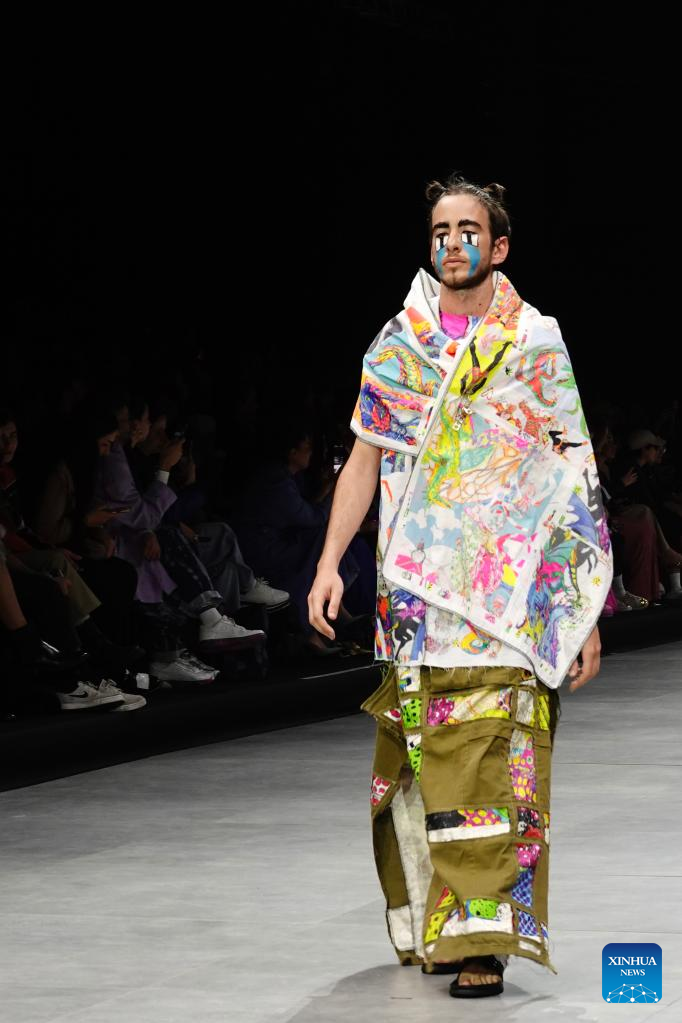
A model presents a creation made of second-hand clothes and rejected materials during the Tel Aviv Fashion Week in Tel Aviv, Israel, on March 19, 2023. Rags, cans, faded plastic wrap ... household waste-turned garments made an eye-catching debut on the catwalk of Israel's Tel Aviv Fashion Week, with this year's event shining a spotlight on sustainable fashion. The annual fashion week ended Wednesday, but the discussion on sustainable fashion is far from over. Here in the economic and hi-tech hub of Israel, fashion goes beyond beauty and delicacy, as organizers and designers call for environmental awareness, particularly pollution and excessive consumption brought by the fashion industry's overproduction. (Xinhua/Wang Zhuolun)
by Xinhua writer Wang Zhuolun
JERUSALEM, March 22 (Xinhua) -- Rags, cans, faded plastic wrap ... household waste-turned garments made an eye-catching debut on the catwalk of Israel's Tel Aviv Fashion Week, with this year's event shining a spotlight on sustainable fashion.
The annual fashion week ended Wednesday, but the discussion on sustainable fashion is far from over. Here in the economic and hi-tech hub of Israel, fashion goes beyond beauty and delicacy, as organizers and designers call for environmental awareness, particularly pollution and excessive consumption brought by the fashion industry's overproduction.
The opening catwalk on Sunday focused on "turning waste into treasure." For anyway without prior knowledge, it would be hard to imagine that all the chic creations are made of second-hand clothes and rejected materials.
"Sustainability is a major part of my work, and this collection is entirely up-cycled. They are made out of textile waste and pre-used garments," David Wexler, an Israeli fashion and textile designer featured on the opening runway, told Xinhua.
"We take clothes, open them up, and combine them to show people that it's possible to reuse and find different ways to wear what you already have in your wardrobe," said Wexler, adding digital printing technology is used to shorten the production time.
"I hope I will inspire people that what you already possess and have, even if it's a bit torn or needs mending, even if it has a stain, it's not the end of the garment, you can still find different ways to use it and to elevate it into new and exciting pieces," he noted.
"We want to send signals to people that it is entirely possible to re-wear the dull clothes in your wardrobe in an ingenious way," he added.
"We are together looking for designers that are innovative and have a positive impact on the world in terms of sustainability and creativity," Ronen Samuel, chief executive of Kornit Digital, an Israel-headquartered manufacturing company and the organizer of Tel Aviv Fashion Week, told Xinhua.
The modern textile industry is highly dependent on petrochemical products, and many clothing fabrics are made of polyester fiber, the raw material of which is mainly obtained from petroleum cracking.
According to data released by the United Nations Environment Program, the textile and clothing industry emits more carbon than all international flights and seaborne combined, accounting for 10 percent of the world's total carbon emissions.
Typical fashion and textile production usually takes half a year, while clothes on display during Tel Aviv Fashion week are produced in only three weeks, using digital printing technology, said Samuel.
He added that digital printing enables an image or pattern designed on a computer to be directly printed on fabric, omitting the energy-intensive pretreatment, printing, steaming and washing in traditional textile printing.
What's more, to use traditional textile printing, "you need to produce in large quantities, which creates a lot of waste," he said, adding "in terms of sustainability, we are driving the agenda of making fashion more sustainable and relevant for the entire world."
Sitting off the stage to observe, it is not difficult to find that the models are in different sizes and heights. Dressed in clothes made of shabby cloth that had been nearly thrown into the trash can, they looked confident and energetic as walking on the catwalk.
Among the 40 models, only two are professional ones, while the rest are ordinary people from various industries, including hi-tech employees, restaurant waiters and infamous dancers, said Wexler.
He explained that this is just like fashionable clothes don't have to be brand-new and flowery, neither do men have to be tall and handsome nor do women have to be in so-called perfect shapes.
"Fashion exists for ordinary people, not models," he said. ■
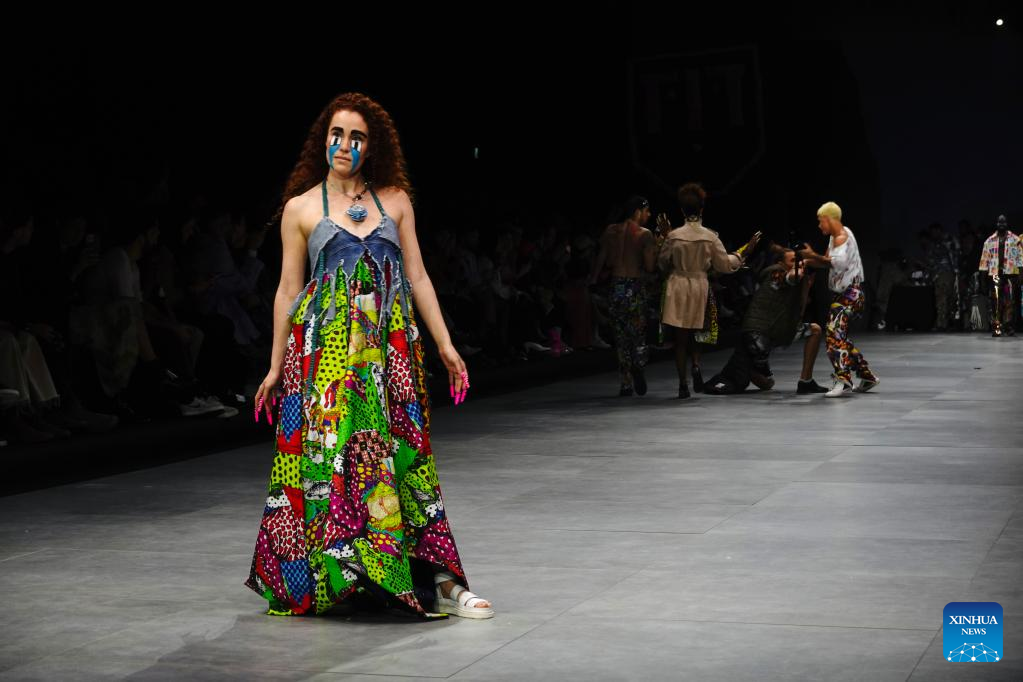
A model presents a creation made of second-hand clothes and rejected materials during the Tel Aviv Fashion Week in Tel Aviv, Israel, on March 19, 2023. Rags, cans, faded plastic wrap ... household waste-turned garments made an eye-catching debut on the catwalk of Israel's Tel Aviv Fashion Week, with this year's event shining a spotlight on sustainable fashion. The annual fashion week ended Wednesday, but the discussion on sustainable fashion is far from over. Here in the economic and hi-tech hub of Israel, fashion goes beyond beauty and delicacy, as organizers and designers call for environmental awareness, particularly pollution and excessive consumption brought by the fashion industry's overproduction. (Xinhua/Wang Zhuolun)

A model presents a creation made of second-hand clothes and rejected materials during the Tel Aviv Fashion Week in Tel Aviv, Israel, on March 19, 2023. Rags, cans, faded plastic wrap ... household waste-turned garments made an eye-catching debut on the catwalk of Israel's Tel Aviv Fashion Week, with this year's event shining a spotlight on sustainable fashion. The annual fashion week ended Wednesday, but the discussion on sustainable fashion is far from over. Here in the economic and hi-tech hub of Israel, fashion goes beyond beauty and delicacy, as organizers and designers call for environmental awareness, particularly pollution and excessive consumption brought by the fashion industry's overproduction. (Xinhua/Wang Zhuolun)
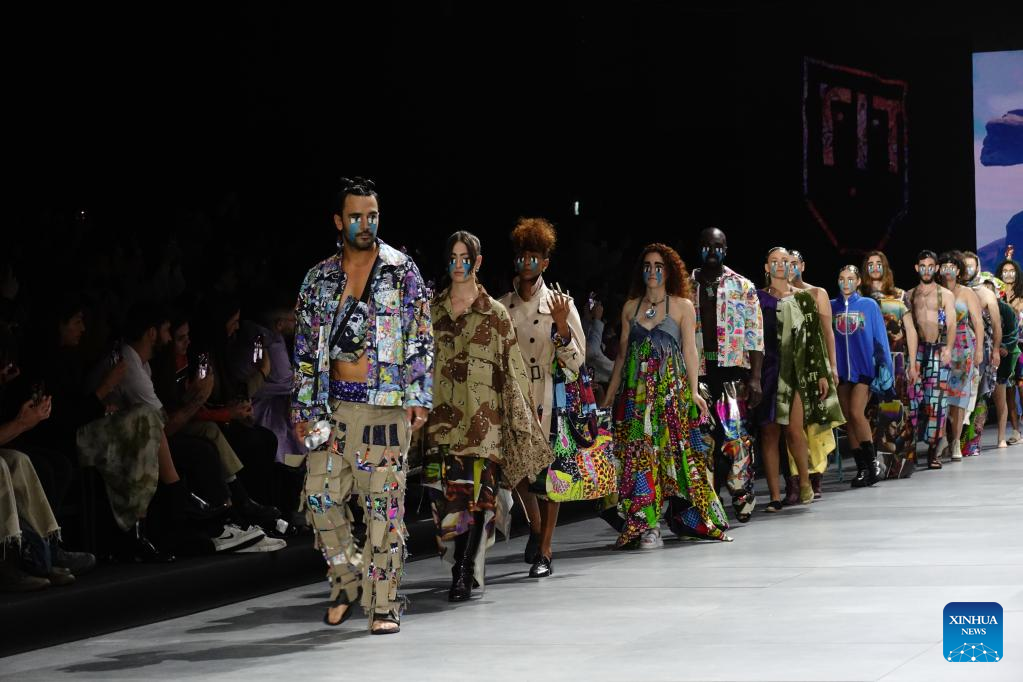
Models present creations made of second-hand clothes and rejected materials during the Tel Aviv Fashion Week in Tel Aviv, Israel, on March 19, 2023. Rags, cans, faded plastic wrap ... household waste-turned garments made an eye-catching debut on the catwalk of Israel's Tel Aviv Fashion Week, with this year's event shining a spotlight on sustainable fashion. The annual fashion week ended Wednesday, but the discussion on sustainable fashion is far from over. Here in the economic and hi-tech hub of Israel, fashion goes beyond beauty and delicacy, as organizers and designers call for environmental awareness, particularly pollution and excessive consumption brought by the fashion industry's overproduction. (Xinhua/Wang Zhuolun)
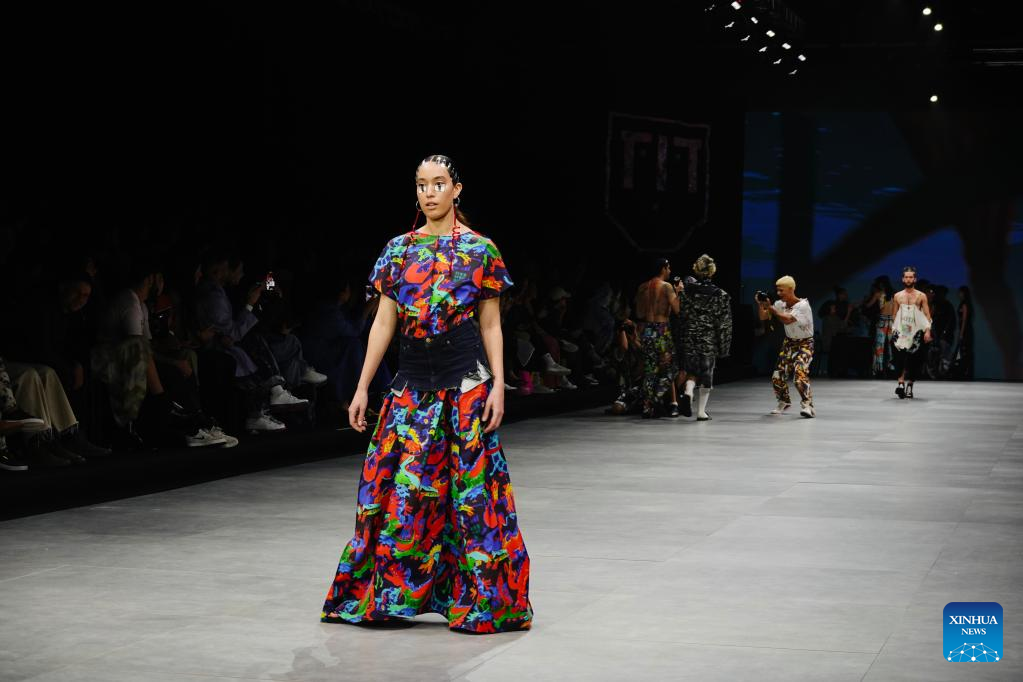
A model presents a creation made of second-hand clothes and rejected materials during the Tel Aviv Fashion Week in Tel Aviv, Israel, on March 19, 2023. Rags, cans, faded plastic wrap ... household waste-turned garments made an eye-catching debut on the catwalk of Israel's Tel Aviv Fashion Week, with this year's event shining a spotlight on sustainable fashion. The annual fashion week ended Wednesday, but the discussion on sustainable fashion is far from over. Here in the economic and hi-tech hub of Israel, fashion goes beyond beauty and delicacy, as organizers and designers call for environmental awareness, particularly pollution and excessive consumption brought by the fashion industry's overproduction. (Xinhua/Wang Zhuolun)
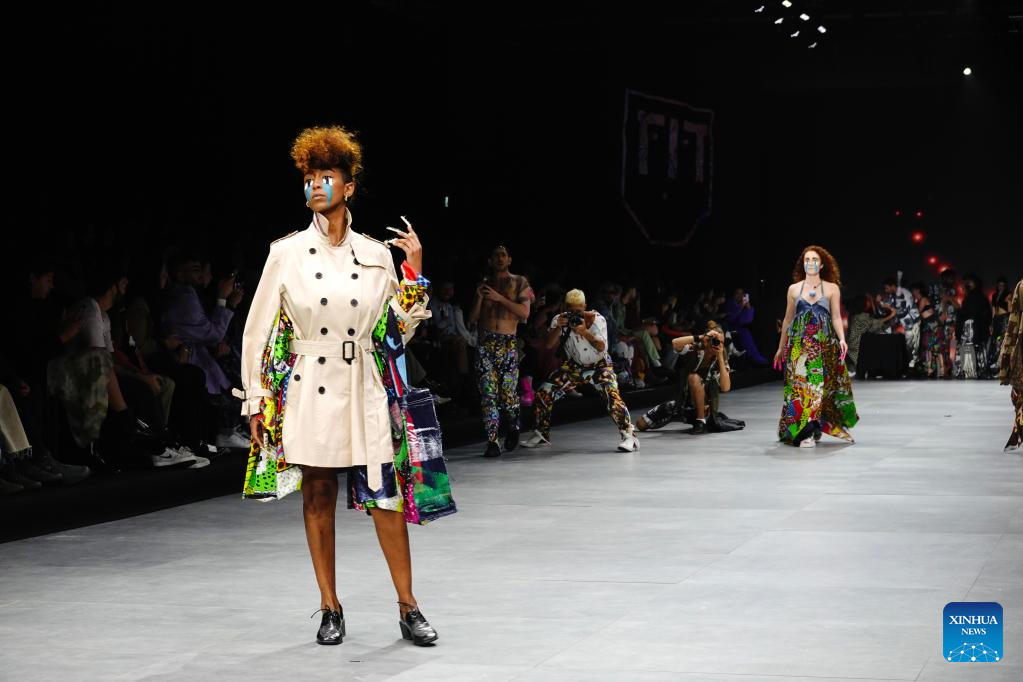
A model presents a creation made of second-hand clothes and rejected materials during the Tel Aviv Fashion Week in Tel Aviv, Israel, on March 19, 2023. Rags, cans, faded plastic wrap ... household waste-turned garments made an eye-catching debut on the catwalk of Israel's Tel Aviv Fashion Week, with this year's event shining a spotlight on sustainable fashion. The annual fashion week ended Wednesday, but the discussion on sustainable fashion is far from over. Here in the economic and hi-tech hub of Israel, fashion goes beyond beauty and delicacy, as organizers and designers call for environmental awareness, particularly pollution and excessive consumption brought by the fashion industry's overproduction. (Xinhua/Wang Zhuolun)
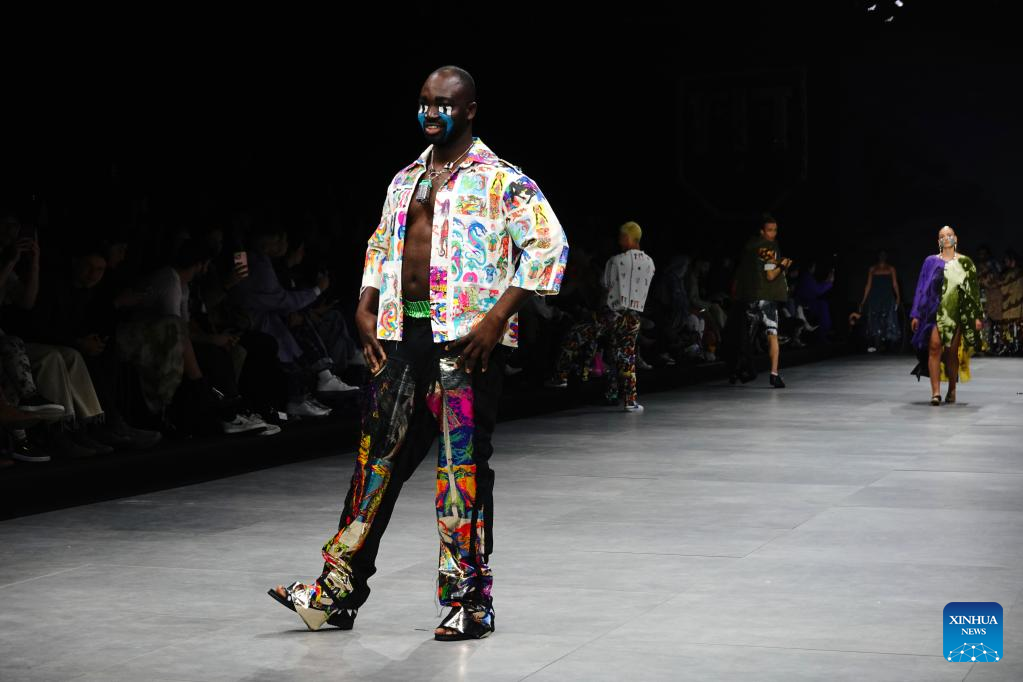
A model presents a creation made of second-hand clothes and rejected materials during the Tel Aviv Fashion Week in Tel Aviv, Israel, on March 19, 2023. Rags, cans, faded plastic wrap ... household waste-turned garments made an eye-catching debut on the catwalk of Israel's Tel Aviv Fashion Week, with this year's event shining a spotlight on sustainable fashion. The annual fashion week ended Wednesday, but the discussion on sustainable fashion is far from over. Here in the economic and hi-tech hub of Israel, fashion goes beyond beauty and delicacy, as organizers and designers call for environmental awareness, particularly pollution and excessive consumption brought by the fashion industry's overproduction. (Xinhua/Wang Zhuolun)



